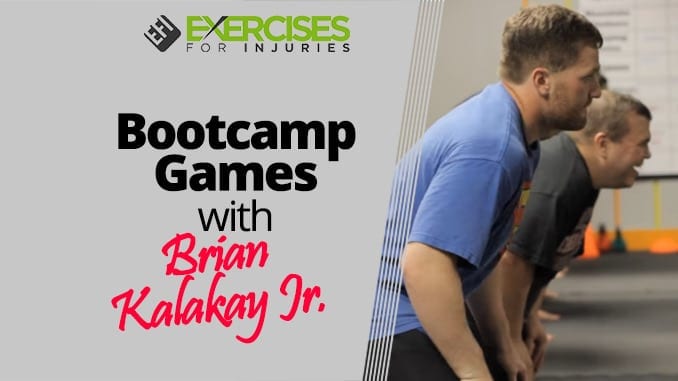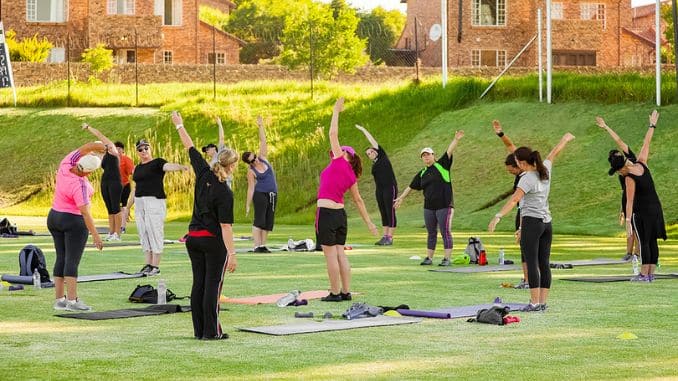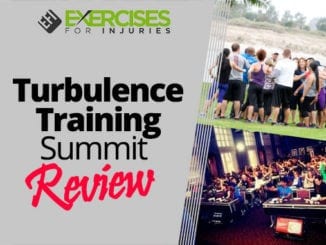
I heard Brian Kalakay talk about Bootcamp games in June at TT Summit.
Here is a little clip from the presentation:
I asked if he had some more information and ideas that he could share with EFI readers. He has said he has a lot of stuff on Bootcamp games that will help trainers and coaches. Take it away, Brian.
Hey everyone!
My name is Brian Kalakay, and I play games in my boot camp classes.
You heard me; I PLAY GAMES IN BOOT CAMP.
It is a weird combination (like a blind guy and sharpshooting), but it works!
You are probably asking yourself, who is this guy, and why is he playing games instead of working his clients out? Well, here are the answers.
I started my fitness boot camp career by running small group classes out of a big box gym [¹]. I rented a 12-foot by 12-foot floor and filled it with eight people. The reason for eight people was simple; that’s all I could fit in there! I was hitting a point where I had to grow my business, but obviously, the environment prohibited that growth. I had to think of something to get more people in to find a location of my own. With competition around every corner, I had to find something to make me look different from the guy down the street. That is when I figured it out.
Types Of Bootcamp Games
When we talk about Bootcamp games in the context of Bootcamps, we’re referring to any interactive experience that is meant to be both fun and educational. When choosing the suitable match for your class, keep in mind the type of activities you’re currently using in your curriculum. This includes everything from online trivia to classic board games like Scrabble and Monopoly. Bootcamp games can get the course talking and engaged. They can also be used as ice-breakers to help students open up and feel more at ease in the classroom environment. Some Bootcamp games even assess what the students have learned.
I would take the old games I used to play with my karate classes (I taught karate for eight years) and put a fitness twist on them. It was a crazy shot in the dark, but I had nothing to lose at this point.
The first time I used the games, I decided to use them at the end of class, just like we did in karate. I held my breath and prayed that everyone didn’t look at me like a fool. I couldn’t believe my eyes! Everyone was jumping around and giggling like little kids; full-grown 30-40-year-old adults were playing with each other like they were on a playground.
The following week, I heard about how much fun that game was and how we should play more. That is all it took. From that day forward, I decided to use games at the end of class every day.
Fast forward a year from that time: now, I currently own a 7800-square-foot boot camp/small group training facility in Lapeer, Michigan. We just opened about four months ago and are already over 120 members. I can confidently say that the games I played at the end of my boot camps were a huge part of that success.

So What Exactly Are Boot Camp Games?
Boot Camp Games are a hybrid of fitness drills and exercises mixed with “recess style” games and races. Think back to when you were young, and you used to play games like “Duck, Duck, Goose,” Dodge Ball, Freeze Tag, and Relay Races. Combine that with fitness elements like pushups, sprints, squat hops, planks, etc. Then, you have a boot camp game. It’s that easy. If you are still lost, here is a great example:
Red Light/Green Light
Format: Everyone for themselves
Supplies Needed: None
How to Begin: Have everyone get a single file line across the floor.
Objective: The first person to move down the floor and back to the starting line wins.
Rules: Pick an exercise. Leapfrogs or squat hops usually work best.
When you say “green light,” everyone will hop as fast and as far as they can down the floor until you say “red light.”
Everyone must stop when “red light” is called, and then they may resume when “green light” is called again.
Great game to build reaction time and jumping strength.
Here is a video of the game in action:
As you can see, putting one of these games together at the end of an excellent boot camp session doesn’t take much. However, there are some things that you can do that will either help or hurt your success with these activities.
Top 5 Mistakes Instructors Make When Doing Games
Here are the top 5 mistakes that I see instructors make when creating a game for the end of a session:
1. Exercises In the Games Are Too Hard
Believe it or not, this can make the game fail in the eyes of your clients. Games are designed to take their minds off exercise and end the class on a high note. Why would you want to continue this torture if your clients were just beaten to the ground for 50 minutes straight with challenging exercise? They are tired, and their coordination isn’t usually the best at this point of the session.
Keep the exercise element in the Bootcamp games, but make the exercises easy to follow/understand. Keep the format simple. This allows your clients to “unwind” and have a little fun. This leads me to the next problem.
2. Not Enough FUN
The truth is that your clients can get a challenging workout anywhere. Any trainer can make a client “feel the burn” and wake up sore the next day. YOU want to have the ability to entertain your clients and work them out simultaneously. This way, when clients leave your boot camp, they can’t wait to go home and post on Facebook how much fun they are having at your facility. Nobody wants to exercise. Everyone wants to have fun!
3. Everyone Isn’t Involved
This happens quite a bit. You have a small group of individuals doing all the activity, and the other group is just sitting there doing nothing. It’s OK that they rest while the other group works. Just make sure that they are cheering on their teammates. You want everyone to feel engaged with the activity; this way, nobody feels like the “bench warmer” on the football team.
4. Forgetting To Market With Games
This is probably the biggest problem I see with people who use games. It would help if you were snapping photos on your phone and posting them to Facebook during the game. After class, tag the members in the image or have your assistant do it. When clients get home, they can see the pics and spread the word about how much fun they had at YOUR boot camp.
5. Not Enough Energy In the Games
Make sure that when you create a game, it will create a “loud” environment. I mean an environment filled with laughter, excitement, and energy. Your clients should be going crazy at the end of the session. It’s like exciting them up to send them home. The more positive energy [²] and sense of community they feel, the better the chance of liking the game and wanting to return tomorrow.
This concept is a MUST for any successful group training program, from generating new referrals to retaining current clients. If you aren’t doing games yet, it is time to start. You have nothing to lose and everything to gain. Plus, if you don’t do it, the competitor down the road probably will.
My challenge is to write down a list of 10 relay races or ten games you could play at the end of one of your boot camp sessions and implement them ASAP. When you do, I would love to hear about how they worked!
Feel free to comment and post your success stories below.
Brian Kalakay
Creator of TT Boot Camp Games
References
1.Fitzgerald, R. (2011, June 1). Hardcore anywhere: how to keep your training consistent, heavy, and intense at big-box gyms and everywhere else. Document – Gale OneFile: Health and Medicine. https://go.gale.com/ps/i.do?id=GALE%7CA258242653&sid=googleScholar&v=2.1&it=r&linkaccess=abs&issn=07445105&p=HRCA&sw=w&userGroupName=anon%7E56ed1e8c&aty=open-web-entry
2. Witten, E. (1981). A new proof of the positive energy theorem. Communications in Mathematical Physics, 80(3), 381–402. https://doi.org/10.1007/bf01208277


